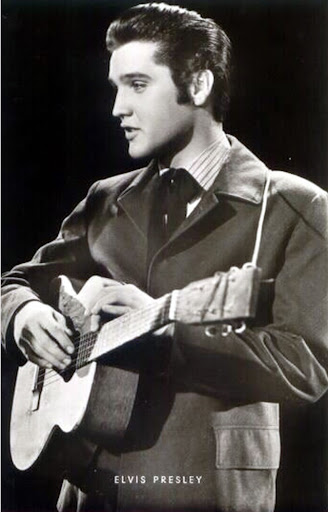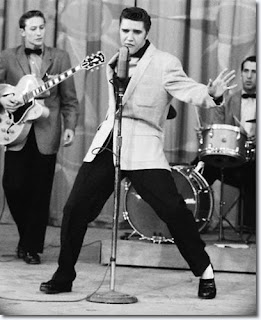 Helloo0O Ladies and Gentlemen!
Helloo0O Ladies and Gentlemen! Welcome back to Graceland Ontario where we discuss the success lessons of the King of Rock ‘n’ Roll and see how we can apply these lessons in your life. Today, we’ll be talking about something I call ‘The Time Trap”.
Sounds kinda like the name of some 60’s TV series (anyone else watch The Time Tunnel from 1966-1967, co-starring James Darren and Robert Colbert with Whit Bissell, John Zaremba and the beautiful Lee Meriwether? Man that was good… but anyways…). What we’re saying here is that people know something’s coming in the future. It’s big, it’s scary, and it might be career changing (for better if you do it right, for worse if you flub it). But because it’s so scary, people won’t start it. They won’t even touch it. They’ll procrastinate about it because they’re scared they’re going to mess up. But they don’t think this. Instead, they pretend they have more time than they do. “I’ve still got a month,” they’ll say.
“I’ve still got a week,” they’ll say.
“I’ve still got an hour.” They put it off until they cannot possibly avoid it anymore. Either it never gets done or it gets done really badly and it blows the toes off their career (and relationship with their superiors). They trick themselves into thinking there’s more time than there is until they’re ‘trapped’ and have to do something disasterous (if they do anything at all) to make up for lost time. Yea, and that’s right − doing a bad job isn’t going to win you any medals. It’s not going to make you more successful or any money either. It might burn you, though.
They put it off until they cannot possibly avoid it anymore. Either it never gets done or it gets done really badly and it blows the toes off their career (and relationship with their superiors). They trick themselves into thinking there’s more time than there is until they’re ‘trapped’ and have to do something disasterous (if they do anything at all) to make up for lost time. Yea, and that’s right − doing a bad job isn’t going to win you any medals. It’s not going to make you more successful or any money either. It might burn you, though. Burn you bad.
So, this paradox of imagining extra time when you don’t have it is called “The Time Trap”.
“But what can I do about this?”
Well, let’s look at our pal Elvis Presley and see whether The Time Trap hurt him; possibly, but it’s hardly noticeable. Elvis was constantly producing new records, new songs, new movies − The Time Trap is a form of procrastination that prevents you from producing, or makes you produce badly. As Elvis didn’t do too much stuff that we hate, it seems The Time Trap didn’t hurt him too much.
Why is this? Perhaps Colonel Parker, his manager, was on his back about working, perhaps crazy record/ movie execs pushed Elvis to work in a wheelchair every morning to get him going. Or maybe one of the reasons Elvis was so incredibly successful was simply because he was good at overcoming The Time Trap. Perhaps he was one of those incredible individuals who loved their job and could have enough fun doing their job that they would get to work despite The Time Trap. He acted differently to 99% of the population and was therefore more successful than 99% of the population.
So, first you need to know if this applies to you. That’s answered simply: do you produce as much as you should or would like to? And if you don’t, is it because you keep putting it off, because of procrastination?
Then this’s for you.
Next, how do you deal with this?
One, you can get ‘a crazy record exec’ to help you − if you have somebody, a friend, your spouse, pushing you to do something, you’ll be less likely to procrastinate. That’s how my Mum got my brother to clean his room all that time ago − she kept pressuring him until he got sick of it and finished it. Another method I learnt from David DeAngelo (a dating coach who also works as a business coach under his real name, Eben Pagan) was to put something you didn’t want to lose on the line. You’d tell a friend about your goal and say that if you didn’t get it done you’d have to give them, say, $20 to pay for not doing it. This might work even better if the money goes to an enemy. You don't want to be paying your enemy with your money. That way it will further inspire you beat The Time Trap.
Two, get a job you like. It was the second article I wrote on Graceland Ontario and I stand by the message as much now as I did then. If you like writing, try journalism. If you like music, try to become a soundman (or a full out musician if you’re really brave). If you like being a salesman, be a corporate salesman. The truth is the more you want a certain job and enjoy the work, the less likely you are to procrastinate. Why? Because you want to do well with the work, not with your boss. If they didn’t pay you, you’d still do the work because you enjoy it so much. Then, The Time Trap and nobody else will stop you from working.
Three, if you can’t give up your current job, find the fun in it. If it’s fun wrapping up burgers in McDonald's, then you’ll like the job more. If it’s fun working on high pressure assignments because you feel like James Bond or something, then you’re more likely to try it than wait around for The Time Trap to get you. This is like step two, minus the job you like. If you have to do something you don’t like, at least making it fun will make it bearable. And, hopefully, you'll be more successful in business and life. Thanks for reading this article! I hope it will help you become more successful and productive in your daily life. Now get to work!
Thanks for reading this article! I hope it will help you become more successful and productive in your daily life. Now get to work! Elvis’s Lessons:
People often kid themselves they have more time than they do. Then, a deadline sneaks up on you and you mess up. This form of procrastination is something I call The Time Trap. To overcome this, you can get someone to force you to acknowledge your work, you can choose a job you like and enjoy it enough to work through procrastination or you can find the fun in your current job. Thanks for reading, now go get to work!
P.S. If you're interested seeing Elvis in one of his 60's movie songs (when he was fighting the time trap all the time with those crazy movie execs), here's a Youtube video of him singing "I'll Take Love" from Easy Come, Easy Go in 1967... I mean, what a great song!
P.P.S. Remember to leave a comment or story either underneath this post or send it to my email, alexghilson@gmail.com to continue the conversation.

















